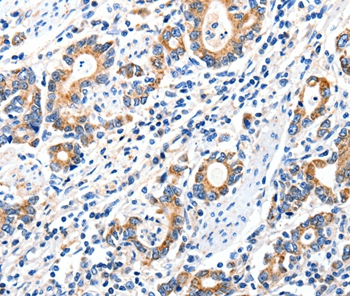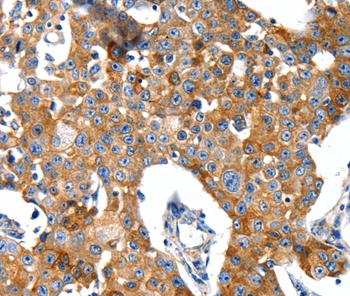Product Detail
Product NameGRIA2 Antibody
Host SpeciesRabbit
ClonalityPolyclonal
PurificationAntigen affinity purification.
ApplicationsIHC
Species ReactivityHu Ms Rt
SpecificityThe antibody detects endogenous levels of total GRIA2 protein.
Immunogen TypePeptide
Immunogen DescSynthetic peptide corresponding to a region derived from internal residues of human glutamate receptor, ionotropic, AMPA 2
Target NameGRIA2
ConjugateUnconjugated
Other NamesGLUR2; GLURB; GluA2; HBGR2; GluR-K2
Accession NoSwiss-Prot#: P42262
NCBI Gene ID: 2891
Gene Accssion: NP_000817
Uniprot
P42262
Gene ID
2891;
Concentration1.1mg/ml
FormulationRabbit IgG in pH7.4 PBS, 0.05% NaN3, 40% Glycerol.
StorageStore at -20˚C
Application Details
Immunohistochemistry: 1:25-1:100
Immunohistochemical analysis of paraffin-embedded Human gastric cancer tissue using #37006 at dilution 1/40.
Immunohistochemical analysis of paraffin-embedded Human breast cancer tissue using #37006 at dilution 1/40.
Glutamate receptors are the predominant excitatory neurotransmitter receptors in the mammalian brain and are activated in a variety of normal neurophysiologic processes. This gene product belongs to a family of glutamate receptors that are sensitive to alpha-amino-3-hydroxy-5-methyl-4-isoxazole propionate (AMPA), and function as ligand-activated cation channels. These channels are assembled from 4 related subunits, GRIA1-4. The subunit encoded by this gene (GRIA2) is subject to RNA editing (CAG->CGG; Q->R) within the second transmembrane domain, which is thought to render the channel impermeable to Ca(2+). Human and animal studies suggest that pre-mRNA editing is essential for brain function, and defective GRIA2 RNA editing at the Q/R site may be relevant to amyotrophic lateral sclerosis (ALS) etiology. Alternative splicing, resulting in transcript variants encoding different isoforms, (including the flip and flop isoforms that vary in their signal transduction properties), has been noted for this gene.
If you have published an article using product 37006, please notify us so that we can cite your literature.
et al,The intermittent administration of ethanol during the juvenile period produces changes in the expression of hippocampal genes and proteins and deterioration of spatial memory. In Behav Brain Res on 2019 Oct 17 by Contreras A, Morales L, et al..PMID:31201872
, (2019),
PMID:
31201872




 Yes
Yes



